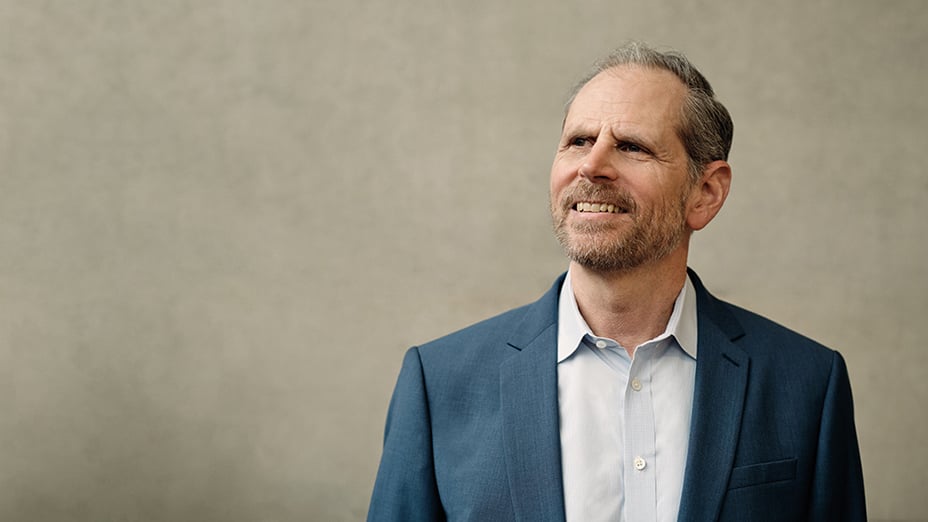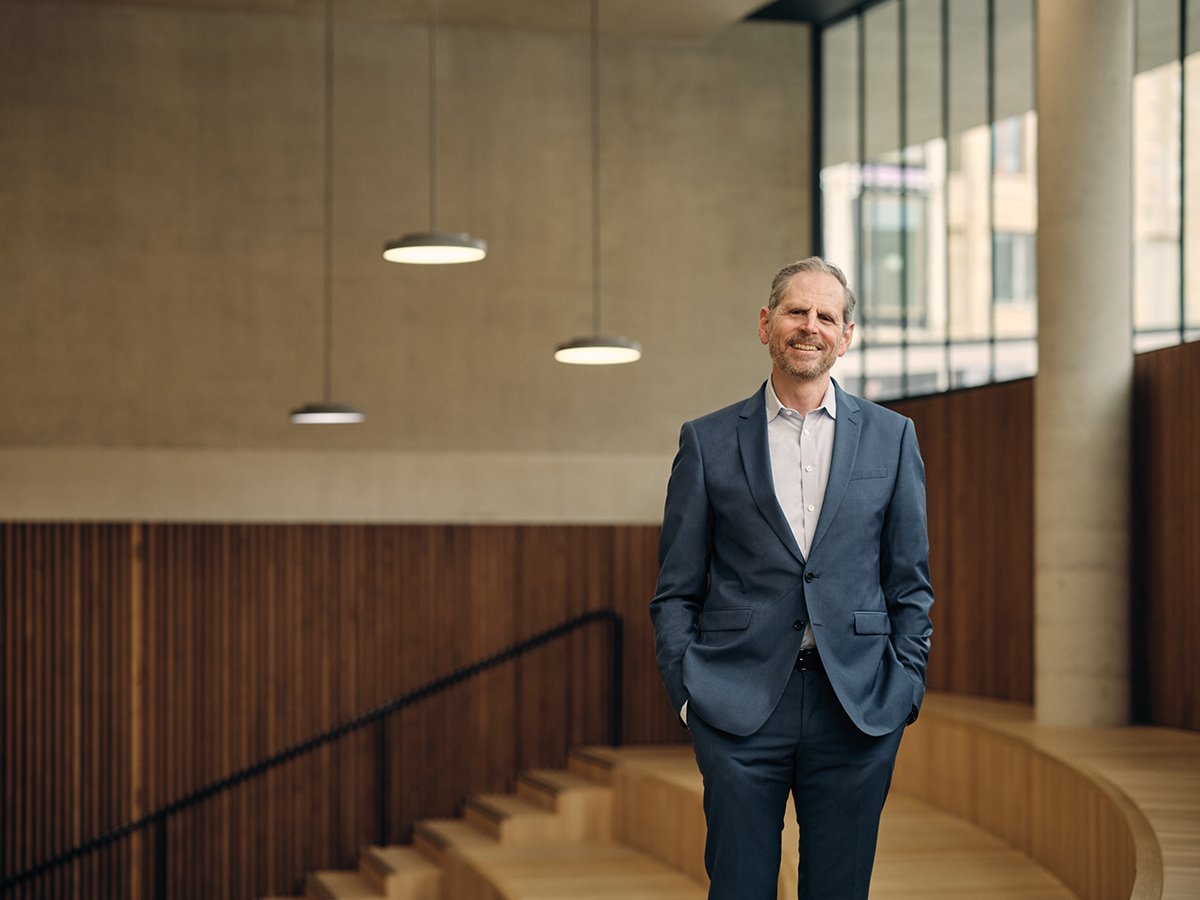
Photography by Duncan Elliott
Please remember that the value of an investment can fall and you may not get back the amount invested.
A career as a software entrepreneur, then a venture capital investor, then a business consultant, taught Prof Eric Beinhocker that his college teachers and textbooks had misled him.
The economy, he found, is not a machine kept in balance by rational behaviour. Instead, it’s a dynamic, innovative, evolving system that comprises billions of human impulses, actions and reactions.
Beinhocker’s study The Origin of Wealth (2007) suggests prosperity stems from the same evolutionary processes as those governing the natural world. Wealth-creating companies search for new ways to meet customer needs and in the process create new technologies, products and services that continuously change the economic system.
Now director of the University of Oxford’s Institute for New Economic Thinking at the Oxford Martin School (INET Oxford) and a visiting professor at the Santa Fe Institute in New Mexico, Prof Beinhocker is preparing a new book that seeks to redefine the market economy and show how to build a more just and sustainable system.
Gary Robinson: Where did your interest in how wealth is created come from?
Eric Beinhocker: Working with small businesses, I found that that world was hugely dynamic and innovative. The way we made money was not when things were in equilibrium, as the textbooks said, but when they were out of balance and change was happening. It motivated me to explore new ways of describing the economy, which is when I came across the work of the Santa Fe Institute on complex adaptive systems.
GR: What are complex adaptive systems?
EB: Since the 1970s, scientists have observed how systems built up of networks of small units or agents interact and evolve in complex and dynamic ways. Those agents then create higher-level patterns, the way water molecules combine to create a whirlpool. They’re called ‘adaptive’ because the agents can change their behaviours. These complex adaptive systems describe everything from our bodies to biological ecosystems to the internet and artificial intelligence.
The economy itself fits this description. It contains individuals and firms interacting in lots of complex networks and relationships. These interactions create patterns: booms and busts, inflation, business cycles, unemployment, etc. Understanding how these macro patterns emerge from the bottom up seemed more productive than the traditional top-down view.

Gary Robinson in conversation with Eric Beinhocker in May
GR: How does evolutionary theory help us to think about the economy?
EB: Evolution is a simple process of experimentation where a variety of designs is created, some survive better than others and the successful designs grow. With organisms, it goes on through variations in their genes followed by selection based on fitness, then reproduction. But the same kind of process goes on in technology.
Take the bicycle. No one type of bicycle will be the best forever. Since Victorian penny-farthings, people have tinkered with different designs. Some worked better than others, and eventually they settled on the design of two wheels, pedals, chain, etc. But even that’s kept developing and evolving. Today, we have road bikes, mountain bikes, city bikes and ebikes: all variations on that theme.
In such evolutionary systems, there’s a process of niche creation and niche filling. For example, no one knew we needed mountain bikes until enthusiasts in the 1970s came up with that design. A whole new niche was born and then filled by various companies innovating around that design. We see this evolutionary process in every industry, from the proliferation of flavours of crisps to the race to find applications for AI.
GR: How can companies extend their lifespan in this competitive ecosystem?
EB: Make evolution your friend. Try to harness it inside your business. Markets are brilliant evolutionary systems in that they foster variety and experimentation between companies. Labour and capital markets provide the talent and funding to scale up the winners – and scale down the losers. But too many companies focus on exploiting whatever niche they’ve been successful in versus exploring for and creating new ones.
To do that, you need to create internal variety and experimentation, be flexible in moving talent and capital to scale up the future winners, and not be afraid to fail. The key is to fail small and often, and scale up and win big. Hanging on to legacy businesses past their peak is the downfall of many companies. But it’s hard when careers are at stake, and there’s a vested interest in maintaining what’s gone on in the past.
GR: How important are a company’s time horizons?
EB: As well as managing the tension between operating well and innovating, durable companies manage the tension of multiple time horizons. They need to ‘wear bifocals’: if they take their eye off the short term, they may not be around for the long term. But if they’re able to keep that long term in focus, make the appropriate trade-offs and take investment risks for that longer term, it can pay off.

GR: Shifting gears, why did you found the Institute for New Economic Thinking?
EB: Through the 1990s and 2000s, there was a growing sense that standard economics was not up to describing the modern economy and might even be leading to wrong answers. When the 2008 crisis hit, we saw the standard models fail very badly at central banks and finance ministries.
Some of us decided it was time to do something about it. I left consulting to set up INET Oxford to explore how we could make better models of the economy and contribute to solving social and public policy problems. We saw enormous opportunities in incorporating modern computational techniques using the vast quantities of data now available.
GR: Are there trade-offs between maximising long-term shareholder value and benefits to society?
EB: They don’t automatically go together. I saw this in my consulting work. We did a good job of helping companies maximise shareholder value and become incredibly efficient, but, within that framework, businesses have huge incentives to dump their problems back on society.
For example, many large US firms have boosted their profits by keeping wage growth below productivity growth. That may be good for the company’s shareholders and its executives paid with stock options. But that isn’t great for the workers themselves just clinging on, for taxpayers who are supporting those workers with food stamps, nor for other businesses who want those workers to have the income to buy stuff from them.
GR: Can you tell us more about your next book?
EB: I’m co-authoring it with Nick Hanauer, a US-based entrepreneur, venture capitalist and policy innovator. We’re exploring the core theme that economies are built not on survival-of-the-fittest, cut-throat competition but on cooperation. Large-scale cooperation enables us to solve our complex problems. It follows that building trust and fair social contracts in societies is key to economic prosperity. Fairness and trust aren’t things we try to create after we get prosperity, they’re a major cause of prosperity.
Traditional economics has this backwards. There is a view that things like pollution or social problems are ‘externalities’ where we can clean up the messes left by markets after the fact. We argue that extreme concentrations of wealth, political systems rigged in favour of the powerful, and a degraded environment have corroded trust, perceptions of fairness and belief in the future – all critical to our future prosperity.
The answer isn’t cleaning up more and bigger messes. It is reworking the system to stop creating the messes in the first place. How we do that is a harder question, but there are a lot of new ideas out there that make us believe it’s not impossible.
Mavericks v the mainstream
The idea of a shape-shifting economy is rooted in the new complexity science of the 1960s and 70s, which was first applied to physics, biology and computing, among other disciplines.
In the late 1980s, Prof W Brian Arthur and others at the Santa Fe Institute led theorists to adapt this way of thinking to economics. Looking to other scientific fields and applying advances in computing power and data, scholars proposed a new conception of economies as dynamic, evolving networks made up of real human beings.
Successive global crises – and failures to foresee them – have moved this controversial re-imagining closer to the mainstream. Now, it’s referenced by central bankers and international organisations, including the Organisation for Economic Co-operation and Development (OECD).
And it’s useful. During the Covid pandemic, J Doyne Farmer, Baillie Gifford Professor of Complex Systems Science, led a team at INET Oxford to build a model that accurately predicted the impact of lockdown on UK GDP. His colleague Eric Beinhocker advocates complexity economics as a tool against inequality, ecological collapse and other problems.
Risk factors
The views expressed should not be considered as advice or a recommendation to buy, sell or hold a particular investment. They reflect opinion and should not be taken as statements of fact nor should any reliance be placed on them when making investment decisions.
This communication was produced and approved in September 2024 and has not been updated subsequently. It represents views held at the time of writing and may not reflect current thinking.
Investing in private companies could increase risk as these assets may be more difficult to sell, so changes in their prices may be greater.
Potential for profit and loss
All investment strategies have the potential for profit and loss, your or your clients’ capital may be at risk. Past performance is not a guide to future returns.
This communication contains information on investments which does not constitute independent research. Accordingly, it is not subject to the protections afforded to independent research, but is classified as advertising under Art 68 of the Financial Services Act (‘FinSA’) and Baillie Gifford and its staff may have dealt in the investments concerned.
All information is sourced from Baillie Gifford & Co and is current unless otherwise stated.
The images used in this communication are for illustrative purposes only.
Important Information
Baillie Gifford & Co and Baillie Gifford & Co Limited are authorised and regulated by the Financial Conduct Authority (FCA). Baillie Gifford & Co Limited is an Authorised Corporate Director of OEICs.
Baillie Gifford Overseas Limited provides investment management and advisory services to non-UK Professional/Institutional clients only. Baillie Gifford Overseas Limited is wholly owned by Baillie Gifford & Co. Baillie Gifford & Co and Baillie Gifford Overseas Limited are authorised and regulated by the FCA in the UK.
Persons resident or domiciled outside the UK should consult with their professional advisers as to whether they require any governmental or other consents in order to enable them to invest, and with their tax advisers for advice relevant to their own particular circumstances.
Financial Intermediaries
This communication is suitable for use of financial intermediaries. Financial intermediaries are solely responsible for any further distribution and Baillie Gifford takes no responsibility for the reliance on this document by any other person who did not receive this document directly from Baillie Gifford.
Europe
Baillie Gifford Investment Management (Europe) Ltd (BGE) is authorised by the Central Bank of Ireland as an AIFM under the AIFM Regulations and as a UCITS management company under the UCITS Regulation. BGE also has regulatory permissions to perform Individual Portfolio Management activities. BGE provides investment management and advisory services to European (excluding UK) segregated clients. BGE has been appointed as UCITS management company to the following UCITS umbrella company; Baillie Gifford Worldwide Funds plc. BGE is a wholly owned subsidiary of Baillie Gifford Overseas Limited, which is wholly owned by Baillie Gifford & Co. Baillie Gifford Overseas Limited and Baillie Gifford & Co are authorised and regulated in the UK by the Financial Conduct Authority.
China
Baillie Gifford Investment Management (Shanghai) Limited
柏基投资管理(上海)有限公司(‘BGIMS’) is wholly owned by Baillie Gifford Overseas Limited and may provide investment research to the Baillie Gifford Group pursuant to applicable laws. BGIMS is incorporated in Shanghai in the People’s Republic of China (‘PRC’) as a wholly foreign-owned limited liability company with a unified social credit code of 91310000MA1FL6KQ30. BGIMS is a registered Private Fund Manager with the Asset Management Association of China (‘AMAC’) and manages private security investment fund in the PRC, with a registration code of P1071226.
Baillie Gifford Overseas Investment Fund Management (Shanghai) Limited
柏基海外投资基金管理(上海)有限公司(‘BGQS’) is a wholly owned subsidiary of BGIMS incorporated in Shanghai as a limited liability company with its unified social credit code of 91310000MA1FL7JFXQ. BGQS is a registered Private Fund Manager with AMAC with a registration code of P1071708. BGQS has been approved by Shanghai Municipal Financial Regulatory Bureau for the Qualified Domestic Limited Partners (QDLP) Pilot Program, under which it may raise funds from PRC investors for making overseas investments.
Hong Kong
Baillie Gifford Asia (Hong Kong) Limited 柏基亞洲(香港)有限公司 is wholly owned by Baillie Gifford Overseas Limited and holds a Type 1 license from the Securities & Futures Commission of Hong Kong to market and distribute Baillie Gifford’s range of collective investment schemes to professional investors in Hong Kong. Baillie Gifford Asia (Hong Kong) Limited 柏基亞洲(香港)有限公司 can be contacted at Suites 2713-2715, Two International Finance Centre, 8 Finance Street, Central, Hong Kong. Telephone +852 3756 5700.
South Korea
Baillie Gifford Overseas Limited is licensed with the Financial Services Commission in South Korea as a cross border Discretionary Investment Manager and Non-discretionary Investment Adviser.
Japan
Mitsubishi UFJ Baillie Gifford Asset Management Limited (‘MUBGAM’) is a joint venture company between Mitsubishi UFJ Trust & Banking Corporation and Baillie Gifford Overseas Limited. MUBGAM is authorised and regulated by the Financial Conduct Authority.
Australia
Baillie Gifford Overseas Limited (ARBN 118 567 178) is registered as a foreign company under the Corporations Act 2001 (Cth) and holds Foreign Australian Financial Services Licence No 528911. This material is provided to you on the basis that you are a “wholesale client” within the meaning of section 761G of the Corporations Act 2001 (Cth) (“Corporations Act”). Please advise Baillie Gifford Overseas Limited immediately if you are not a wholesale client. In no circumstances may this material be made available to a “retail client” within the meaning of section 761G of the Corporations Act.
This material contains general information only. It does not take into account any person’s objectives, financial situation or needs.
South Africa
Baillie Gifford Overseas Limited is registered as a Foreign Financial Services Provider with the Financial Sector Conduct Authority in South Africa.
North America
Baillie Gifford International LLC is wholly owned by Baillie Gifford Overseas Limited; it was formed in Delaware in 2005 and is registered with the SEC. It is the legal entity through which Baillie Gifford Overseas Limited provides client service and marketing functions in North America. Baillie Gifford Overseas Limited is registered with the SEC in the United States of America.
The Manager is not resident in Canada, its head office and principal place of business is in Edinburgh, Scotland. Baillie Gifford Overseas Limited is regulated in Canada as a portfolio manager and exempt market dealer with the Ontario Securities Commission ('OSC'). Its portfolio manager licence is currently passported into Alberta, Quebec, Saskatchewan, Manitoba and Newfoundland & Labrador whereas the exempt market dealer licence is passported across all Canadian provinces and territories. Baillie Gifford International LLC is regulated by the OSC as an exempt market and its licence is passported across all Canadian provinces and territories. Baillie Gifford Investment Management (Europe) Limited (‘BGE’) relies on the International Investment Fund Manager Exemption in the provinces of Ontario and Quebec.
Israel
Baillie Gifford Overseas is not licensed under Israel’s Regulation of Investment Advising, Investment Marketing and Portfolio Management Law, 5755-1995 (the Advice Law) and does not carry insurance pursuant to the Advice Law. This material is only intended for those categories of Israeli residents who are qualified clients listed on the First Addendum to the Advice Law.
115243 10049488










